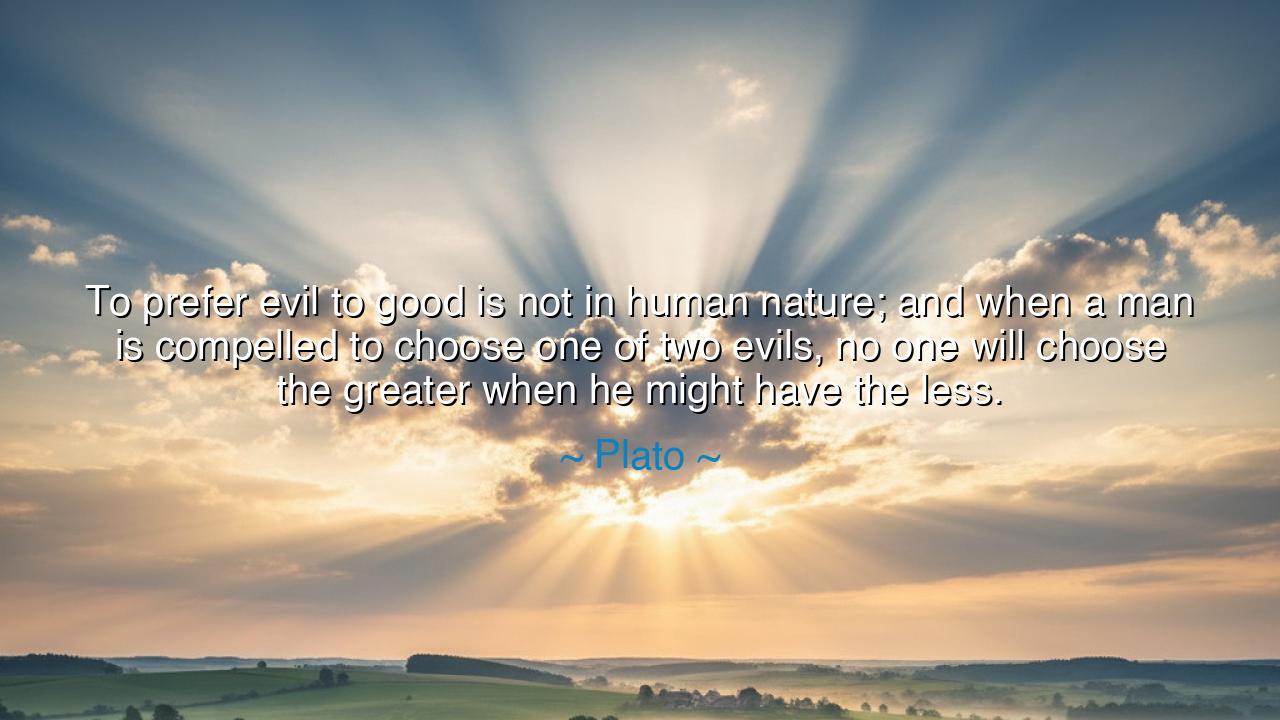
To prefer evil to good is not in human nature; and when a man is
To prefer evil to good is not in human nature; and when a man is compelled to choose one of two evils, no one will choose the greater when he might have the less.






When Plato declared, “To prefer evil to good is not in human nature; and when a man is compelled to choose one of two evils, no one will choose the greater when he might have the less,” he spoke from the deep well of his philosophy of the soul. For Plato believed that within every human being there lies an orientation toward the good, like a compass pointing toward the sun. Though men may falter, though they may stumble into error, their true nature does not desire evil for its own sake. Instead, they are deceived, blinded, or compelled by circumstance—but their hearts, when laid bare, long for the lesser harm, or better still, for the good itself.
This teaching springs from Plato’s larger vision, found in the dialogues where Socrates speaks of the Form of the Good, that radiant truth from which all justice, beauty, and virtue flow. To Plato, no soul willingly chooses corruption over goodness; rather, evil comes from ignorance, from mistaking shadow for light. Thus, when a man is placed in the cruel dilemma of choosing between two evils, his nature still seeks to minimize harm, to preserve some fragment of justice. The soul bends instinctively toward what is less destructive, for within it still flickers the echo of the divine order.
History itself confirms this insight. In the time of the Second World War, when tyranny spread its iron hand across nations, countless ordinary men and women were forced into impossible choices. Consider those who hid the persecuted in their homes, risking their lives but refusing to deliver them to certain death. They did not live in a world where pure good seemed attainable; they lived in a world of shadow, where choices were carved from peril. Yet, true to Plato’s vision, they chose the lesser evil—to deceive the oppressor rather than betray the innocent. In doing so, they preserved their humanity, even when the world itself seemed stripped of it.
Plato’s words also remind us that no man delights in evil simply as evil. The tyrant seeks power because he mistakes it for strength. The greedy man clutches gold because he mistakes it for security. The betrayer wounds his friend because he mistakes self-preservation for wisdom. In every act of evil lies a distortion of the longing for the good. This is why, when presented with degrees of harm, man instinctively recoils from the greater and leans toward the lesser, for the good still whispers even in the darkest chamber of the soul.
The teaching here is heroic: that even in the midst of corruption and error, the human spirit is not utterly lost. The compass still trembles toward the light, however faint. This is why laws, guidance, and education matter—for they strip away the veils of ignorance and help man discern where true good lies. The wise understand that to choose the lesser evil is not to celebrate evil, but to acknowledge human limitation while striving still toward the higher good.
For the seeker of wisdom, the lesson is clear: do not despair of mankind, even when you see atrocity and betrayal. Beneath the ruin lies a soul still made for good. And in your own life, when you cannot reach the pure ideal, do not surrender to despair or apathy. Instead, choose with discernment the path that minimizes harm, that preserves dignity, that keeps you as close as possible to justice.
Practically, live this out by cultivating the discipline of discernment. In times of choice, ask yourself: “Which path leads closer to the good, even if imperfectly?” Do not allow cynicism to drive you into the arms of greater harm, nor pride to blind you to the necessity of compromise. Train your heart daily in the small choices—choosing honesty over falsehood, kindness over cruelty, patience over wrath—so that in greater trials, your compass will not fail you.
Thus Plato’s words endure across centuries: to prefer evil to good is not in human nature. Even when compelled into the shadows, mankind strains toward the light, and even when caught between evils, the soul seeks the lesser harm. This truth is not reason for complacency, but for hope. For as long as man still reaches, however feebly, for the good, there remains the possibility of renewal, of justice, and of redemption.






AAdministratorAdministrator
Welcome, honored guests. Please leave a comment, we will respond soon